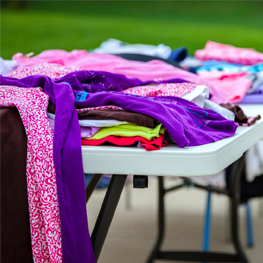
Are your garage, basement and closets overflowing from the heaps of stuff you’ve been saving ‘just in case’? Then it may be time to put it to good use in someone else’s home. Rummage sales are a great way to clear out, recycle and make some extra cash.
Follow these suggestions for a successful sale and a clutter-free home:
The storefront
A garage is usually the best place to hold a sale offering shelter and requiring little daily setup and teardown. If your garage is hard to get to, hidden from view or contains valuables that can’t easily be hidden, use a covered porch or patio or your yard. Keep plenty of tarps available to protect your goods from rain and for covering at the end of the day.
It’s all in the timing
Plan your sale when temperatures are warm outside. Typically, the best days to hold sales are Thursdays through Sundays, with Fridays and Saturdays bringing the most traffic. Mornings bring the greatest flow of shoppers, and the earlier the better. If you open by 7:30 or 8am, rummagers will flock.
Displaying your wares
Don’t heap your merchandise on tables or leave it in boxes to be ransacked. While some don’t mind digging through messy stacks, most people won’t bother.
Hang as much clothing as possible. Use a laundry pole or portable closet or install two support brackets and a closet rod. You can also support a ladder between two stepladders. If you have few clothing items, a clothesline will do.
Plenty of table space is a must. Borrow folding tables, and if you run out, make your own table by resting a sheet of plywood over sawhorses, or prop spare planks of wood between chairs. Keep all but big items off the floor for better visibility.
Neatly fold and stack clothing that can’t be hung on tables, and label stacks according to size. Organize good toys and complete sets where parents and grandparents will easily spot them. Set up a ‘guys’ table with hand tools, gadgets, electronics and home repair items.
Place small articles such as jewelry in divider containers or egg cartons so they are easy to view.
One exception to the disorderly rule is for small toys. Stick all these little goodies in boxes on the ground where young children can dig for treasures to take home. Label boxes according to the price per item or allow children to choose one as a prize.
Finally, make sure batteries or electricity is available to show that items are in working condition.
Next-to-new sells
Appearance plays a big role in the sale of used goods and how much they can bring. Wash and dry all clothing and linens, then fold or hang immediately to prevent wrinkles. Wash dust, dirt and grime from toys, tools and household items.
Priced to sell
Don’t overprice or you’ll wind up packing up nearly as much as you started with. For big items, look through classified ads for typical resale prices. Some top quality items in like-new condition can bring 25 to 35 per cent of the replacement cost. Occasionally, tools, equipment and other items in small supply can be priced higher and could sell for 50 to 60 per cent of replacement cost, depending on age and condition. Most used merchandise will bring 5 to 10 per cent of replacement cost at best.
Advertising
Newspaper classified ads or Craigslist usually bring the best results, unless you live on a main street or a heavily traveled highway. Include your address and main cross streets, dates and times of your sale and what you’ll be selling. List big items individually as well as the categories of items you’ll sell such as ‘tools’ or ‘toddler clothing.’
Also, post fliers on grocery store or laundromat bulletin boards, and if there are no regulations against doing so, post signs on nearby corners. Don’t forget a bright sign in front of your house and balloons tied to your mailbox or a tree.
Tips for success
The bigger the sale, the more traffic you’ll get. Go in with family, friends and neighbors, and hold one big sale rather than several small ones.
Hold a street or subdivision wide sale. This will draw people from surrounding areas.
Move big items such as furniture or appliances into the driveway to attract passersby.
Kimberly is an author and freelance writer. Her articles have appeared in more than 200 newspapers, parenting and women’s magazines, and other publications throughout the US.
Calgary’s Child Magazine © 2024 Calgary’s Child